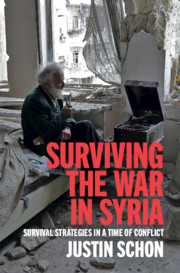Book contents
- Surviving the War in Syria
- Surviving the War in Syria
- Copyright page
- Contents
- Tables
- Figures
- Acknowledgments
- Introduction
- 1 A Theory of Civilian Survival Strategies
- 2 Interviewing Syrian Refugees
- 3 Who Has Violent Experiences? The Reinforcing Misfortunes of Dangerous Locations and Dangerous Connections
- 4 How Psychological Transformations Change Conflict Understandings
- 5 How Wasta Provides Opportunity to Act Safely
- 6 Why and How People Share Information during Conflict
- 7 Choosing When to Migrate
- 8 Conclusion
- Appendix
- Bibliography
- Index
4 - How Psychological Transformations Change Conflict Understandings
Narrative Evolution vs. Narrative Rupture
Published online by Cambridge University Press: 17 September 2020
- Surviving the War in Syria
- Surviving the War in Syria
- Copyright page
- Contents
- Tables
- Figures
- Acknowledgments
- Introduction
- 1 A Theory of Civilian Survival Strategies
- 2 Interviewing Syrian Refugees
- 3 Who Has Violent Experiences? The Reinforcing Misfortunes of Dangerous Locations and Dangerous Connections
- 4 How Psychological Transformations Change Conflict Understandings
- 5 How Wasta Provides Opportunity to Act Safely
- 6 Why and How People Share Information during Conflict
- 7 Choosing When to Migrate
- 8 Conclusion
- Appendix
- Bibliography
- Index
Summary
This chapter shows how PTG and PTSD influence civilian understandings of conflict. It focuses on how civilians consume narratives that elites produce. If civilians lose their ability to continue believing narratives as they evolve, then they undergo a narrative rupture. Narrative ruptures include a loss of understanding of options for survival, so it tends to prompt motivation for migration. The chapter's development of the concept of narratives allows the book to connect processes of PTG and PTSD with how civilians select specific survival strategies. It then describes government and opposition narratives in Syria, illustrating how elites compete to produce the narrative that the largest amount of civilians will believe. After that, it provides numerous examples of narrative ruptures that occurred for respondents that the author interviewed. Finally, the chapter concludes with a discussion of implications for narrative rupture on the debate over safe return vs. voluntary return.
- Type
- Chapter
- Information
- Surviving the War in SyriaSurvival Strategies in a Time of Conflict, pp. 101 - 112Publisher: Cambridge University PressPrint publication year: 2020

